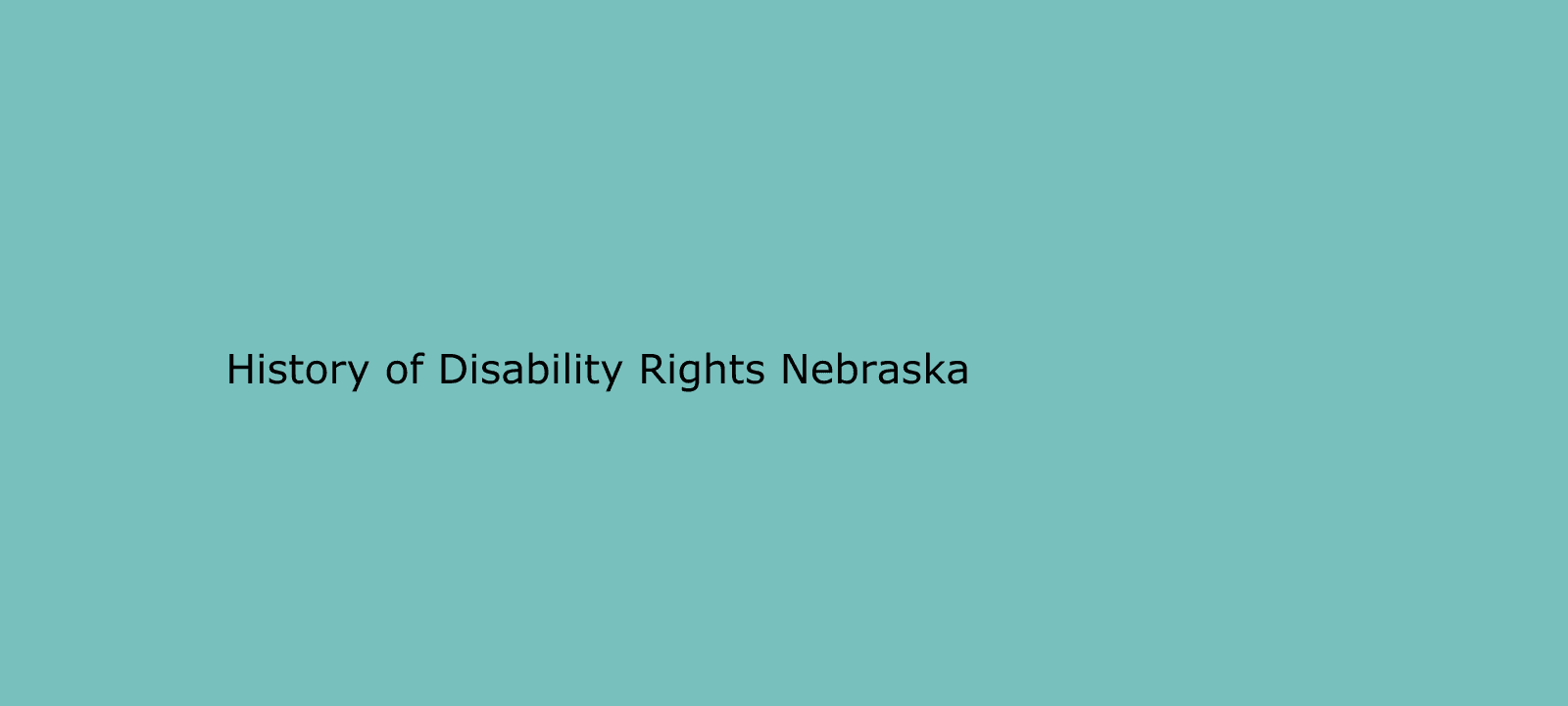1970
- The first ever Citizen Advocacy office is created in Lincoln, NE. (Mirdza Kains, CEO)
- US - Developmental Disabilities Services and Facilities Construction Amendments establishes a definition for developmental disabilities and funds the Developmental Disabilities Planning Councils.
1972 - Geraldo Rivera exposes conditions at Willowbrook
Following an investigative TV series by Geraldo Rivera exposing abuse at Willowbrook, a state institution for children with intellectual disabilities, Congress amended the Developmental Disabilities and Bill of Rights Act in 1975. This led to the creation of Protection and Advocacy (P&A) systems in every state and territory to protect the rights of people with disabilities.
1973 - Rehabilitation Act
The Rehabilitation Act of 1973 (the nation’s first civil law for people with disabilities) passes.
- Section 501 protects people with disabilities in the federal workplace and any organization receiving federal funds
- Section 503 supports employment and education for members of traditionally disadvantaged minority groups
- Section 504 of the Rehabilitation Act of 1973 passed into law, prohibiting discrimination on the basis of disability in federally assisted programs or activities and providing free appropriate public education for K-12 children with disabilities.
1975
- The District Court entered and approved a consent decree on Horacek v. Exon. The consent decree established that many of the residents from the Beatrice State Home (now Beatrice State Developmental Center) be transferred to community-based mental health facilities.
- Protection and Advocacy for Developmental Disabilities - Developmentally Disabled Assistance and Bill of Rights Act of 1975 passed. Protection and advocacy organizations are required by the Act to pursue legal, administrative and other appropriate remedies to protect and advocate for the rights of individuals with developmental disabilities. The Protection and Advocacy for Developmentally Disabled (PADD) is the first program for the Protection and Advocacy systems.
1977 – Founding of Disability Rights Nebraska
Nebraska Advocacy Services for Developmentally Disabled Citizens (NASDD) incorporated. Mirdza Kains is named the Executive Director.
1978
Nebraska Governor J. James Exon designated Nebraska Advocacy Services as the protection and advocacy (P&A) system in Nebraska. As the Protection and Advocacy agency, we are mandated to pursue legal, administrative, and other appropriate remedies and approaches to ensure the protection and advocacy for the rights of individuals with developmental disabilities.
1980
- National Association of Protection and Advocacy Systems (NAPAS) is organized.
- Beth Meyer is named Executive Director of Nebraska Advocacy Services for Developmentally Disabled Citizens.
1982
Timothy F. Shaw is named Executive Director of Nebraska Advocacy Services for Developmentally Disabled Citizens.
1984
Congress created the Client Assistance Program (CAP), which helps individuals who have difficulty applying for or receiving rehabilitative services from the state.
1986
- Nebraska Advocacy Services for Developmentally Disabled Citizens changes its name to Nebraska Advocacy Services, Inc.
- Protection and Advocacy for Individuals with Mental Illness (PAIMI) - The Protection and Advocacy for Individuals with Mental Illness (PAIMI) Act is passed. Nebraska Advocacy Services is awarded PAIMI funding to serve individuals in institutions. The Act was subsequently amended to all Nebraska Advocacy Services to serve individuals with mental illness who reside in the community.
1990 – American’s with Disabilities Act (ADA)
The Americans with Disabilities Act (ADA) was inspired by years of advocacy from people with disabilities, parents, and the independent living movement, which opposed institutionalization. Modeled after the Civil Rights Act of 1964, the ADA provides civil rights protections for individuals with disabilities, ensuring equal opportunities in employment, public accommodations, transportation, government services, and telecommunications.
1993
- State funding was appropriated for citizen advocacy offices.
- Protection and Advocacy for Individual Rights (PAIR) - The Protection and Advocacy for Individual Rights (PAIR) program is established by Congress under an amendment to the Rehabilitation Act in 1993 to assist people not served by the PADD and PAIMI advocacy programs.
1994 - The Protection and Advocacy for Assistive Technology (PAAT)
The Technology-Related Assistance for Individuals with Disabilities Act (P.L. 100-407) of 1988 was reauthorized. The Protection and Advocacy for Assistive Technology (PAAT) program was created.
1998
The District Court entered and approved the consent decree on Carolyn C. v. Johnson. The consent decree secured protection of women from sexual assaults and provided them treatment in the institution and in the community programs for the trauma experienced in their lives. It was the first case in the nation to recognize the importance of trauma-informed and trauma-specific mental health services for women with a history of sexual abuse.
1999 - Protection & Advocacy for Beneficiaries of Social Security (PABSS)
Tickets to Work and Work Incentive Improvement Act of 1999 passed to create the Protection and Advocacy for Beneficiaries of Social Security (PABSS) program. This program assists people with disabilities to begin or return to work.
2000 - Protection & Advocacy for people with Traumatic Brain Injury (PATBI)
Congress established the Protection and Advocacy for Traumatic Brain Injury (PATBI) to protect the rights of people with traumatic brain injury.
2002 - Protection and Advocacy for Voting Access (PAVA)
The Help America Vote Act (HAVA) of 2002 (Pub.L. 107-252) is a United States federal law which passed the House and Senate and was signed into law by President Bush.
2003
Nebraska Advocacy Services is awarded funding to administer the Protection and Advocacy for Voting Access (PAVA) program in Nebraska.
2008
- National Association of Protection and Advocacy System (NAPAS) changed its name to National Disability Rights Network (NDRN).
- ADA Amendments Act - The Americans with Disabilities Act Amendments Act of 2008 broadened the definition of disability to cover more individuals and rejected restrictive Supreme Court rulings. It aimed to simplify the process of proving a disability under the ADA, making protection more accessible.
2009
- The Protection and Advocacy for Beneficiaries of Social Security (PABSS) program was expanded to include investigations of social security representatives.
- Elizabeth M. v. Ross settled in the U.S. Court of Appeals for the Eighth Circuit with the creation of the Women’s Council and development of new approaches to address the treatment needs of women with a history of trauma at the Lincoln Regional Center.
2010
Debra Bauer by and through her guardian Michael Ellsworth v. State of Nebraska settled in the District Court of Gage County in the abuse case that arose out of Nebraska Advocacy Services monitoring of the Beatrice State Developmental Center (BSDC).
2011
Ian Ham by and through Sandra Ham v. Beatrice Community Hospital and Health Center and Thomas Fennessy was settled in the District Court of Gage County. Ian’s health improved and he was able to move out of an institution and into the community.
2012
Nebraska Advocacy Services, Inc. changed its name to Disability Rights Nebraska.
2013
A three-judge panel of the United States Court of Appeals for the Eighth Circuit issued its decision in the Appeal of Michael S. Argenyi v. Creighton University. A federal court jury found in favor of Michael, allowing him to pursue his college education with the accommodation he needed.
2015
Eric A. Evans, Ph. D is named Chief Executive Officer of Disability Rights Nebraska.
2016
In April, Nebraska passed the Olmstead Plan bill (LB1033), requiring the Department of Health & Human Services to create a comprehensive plan to place individuals with disabilities into the most integrated, community-based service settings.
2017
In the summer of 2017, serious health and safety concerns emerged at two Life Quest mental health facilities in Nebraska—one at the Coolidge Center in Palmer and the other at Bel Amis in Blue Hill. Both facilities were found to be noncompliant with Department of Health and Human Services standards following inspections by the Division of Public Health. The Blue Hill facility had a history of regulatory violations dating back to 2012. Public attention intensified after a female veteran died at the Palmer facility on September 3, 2017, highlighting inadequate conditions and lack of treatment.
2018 - Protection & Advocacy for Beneficiaries with Representative Payees (PABRP)
In March 2018, legislation was passed by the U.S. Senate to increase oversight and protection for some of our nation’s most vulnerable citizens. The bill, called the Strengthening Protections for Social Security Beneficiaries Act (H.R. 4547), increased independent oversight of the Social Security Administration’s Representative Payee Program.
2019
- Social Security Representative Payee Program returns to the Protection and Advocacy System through the efforts of the National Disability Rights Network.
- Ruth Cecetka, a patient at the Lincoln Regional Center, sued the facility for delaying a doctor-ordered mammogram and later denying radiation treatment after a breast cancer diagnosis. She received a settlement, and the agreement included changes to LRC’s procedures to help ensure future patients receive timely preventive and medical care.
2022
Tania L. Diaz becomes the Chief Executive Officer of Disability Rights Nebraska.
2024
- The U.S. Department of Justice filed a complaint and proposed consent decree against Lincoln Public Schools (LPS) in Nebraska for violating the Americans with Disabilities Act (ADA). The district had required deaf and hard of hearing students needing ASL interpretation to attend segregated cluster schools, denying them equal access to neighborhood schools and the high school choice program. Disability Rights Nebraska initiated the cases that led to the decree.
- The U.S. Department of Justice found reasonable cause to believe Nebraska is violating the ADA by not providing adequate community-based services for adults with mental illness, leading to unnecessary institutionalization. In May 2024, the DOJ held well-attended town hall meetings across the state to gather public input on the issue.
2025
Disability Rights Nebraska received the 2025 Advocacy Award for shining light on two major systemic civil rights violations in Nebraska: 1) the unnecessary segregation of individuals with serious mental illness and 2) discriminatory practices against deaf and hard of hearing students in Lincoln Public Schools.
-
People Helped
10,613
-
Advocates Trained
45
-
Individuals Trained
15,826







